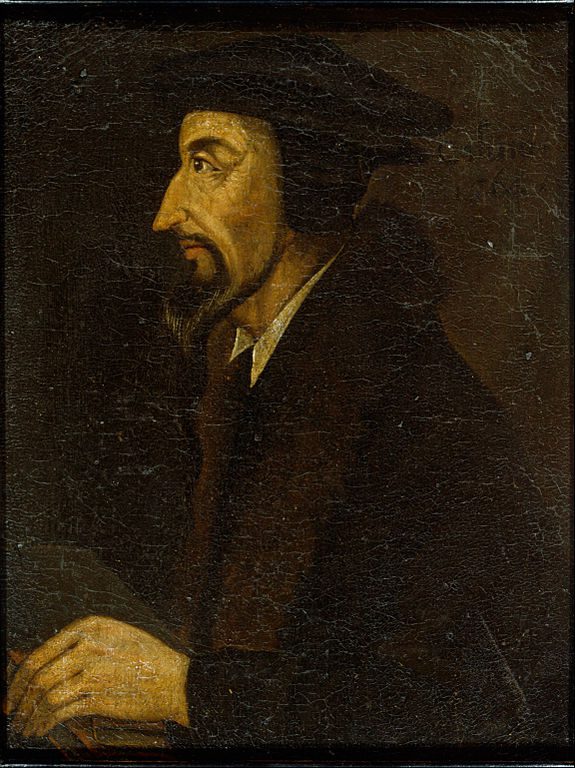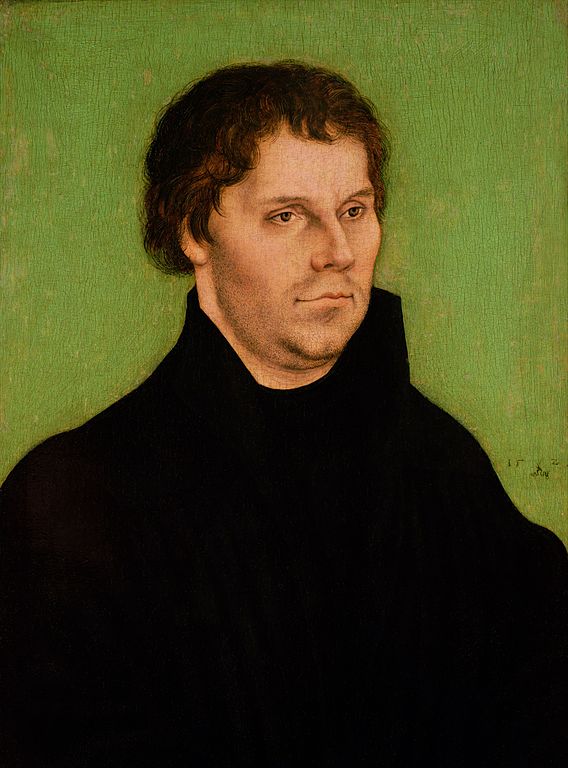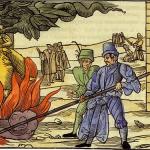
(1-18-08)
***
John Calvin figured out that only a council would unite Protestants doctrinally at war with each other. And he was only talking about agreement on the Eucharist. It never happened. But it’s fascinating that Calvin thought this council (I assume he would regard it as sub-infallible, in accordance with sola Scriptura; which wouldn’t work, anyway) was practically or functionally necessary, and that Scripture alone was not going to achieve a much-desired unity.
***
Thomas Cranmer to John Calvin: 20 March 1552 [complete; blue highlighting my own]
As nothing tends more injuriously to the separation of the Churches than heresies and disputes respecting the doctrines of religion, so nothing tends more effectually to unite the Churches of God, and more powerfully to defend the fold of Christ, than the pure teaching of the Gospel and harmony of doctrine. Wherefore I have often wished, and still continue to do so, that learned and godly men, who are eminent for erudition and judgment, might meet together, and, comparing their respective opinions, might handle all the heads of ecclesiastical doctrine, and hand down to posterity, under the weight of their authority, some work not only upon the subjects themselves, but upon the forms of expressing them. Our adversaries are now holding their councils at Trent, for the establishment of their errors ; and shall we neglect to call together a godly synod, for the refutation of error, and for restoring and propagating the truth? They are, as I am informed, making decrees respecting the worship of the host; wherefore we ought to leave no stone unturned, not only that we may guard others against this idolatry, but also that we may ourselves come to an agreement upon the doctrine of this sacrament. It cannot escape your prudence how exceedingly the Church of God has been injured by dissensions and varieties of opinion respecting the sacrament of unity; and though they are now in some measure removed, yet I could wish for an agreement in this doctrine, not only as regards the subject itself, but also with respect to the words and forms of expression. You have now my wish, about which I have also written to Masters Philip [Melanchthon] and Bullinger; and I pray you to deliberate among yourselves as to the means by which this synod can be assembled with the greatest convenience. Farewell. Your very dear brother in Christ,
Thomas Cantuar
(Letters of John Calvin, Vol. II, edited by Jules Bonnet and translated from Latin and French by David Constable, Edinburgh: Thomas Constable & Co., 1857, pp. 330-331)
John Calvin to Thomas Cranmer: April 1552 [complete]
Your opinion, most distinguished Sir, is indeed just and wise, that in the present disordered condition of the Church, no remedy can be devised more suitable than if a general meeting were held of the devout and the prudent, of those properly exercised in the school of God, and of those who are confessedly at one on the doctrine of holiness. For we see how Satan is attempting, by various devices, to extinguish the light of the Gospel, which, by the wonderful goodness of God, having risen upon us, is shining in many a quarter. The hireling dogs of the Pope cease not to bark, in order to prevent the pure Gospel of Christ from being heard: so great is the licentiousness that is here and there breaking forth, and the ungodliness that is spreading abroad, that religion is become a mere mockery; and those who are not professed enemies of the truth, nevertheless conduct themselves with an impropriety which will create in a short time, unless it be obviated, terrible disorder among us. And not only among the common herd of men here does the distemper of a stupid inquisitiveness alternate with that of fearless extravagance, but, what is more lamentable, in the ranks of the pastors also the malady is now gaining ground. It is too well known with what mad actions Osiander is deceiving himself and deluding certain others. Yet the Lord, as he has done even from the beginning of the world; will preserve in a miraculous manner, and in a way unknown to us, the unity of a pure faith from being destroyed by the dissensions of men. And those whom He has placed on His watchtower He wishes least of all to be inactive, seeing that He has appointed them to be His ministers, through whose labours He may preserve from all corruptions sound doctrine in the Church, and transmit it safe to posterity. Especially, most illustrious Archbishop, is it necessary for you, in proportion to the distinguished position you occupy, to turn your attention as you are doing towards this object. I do not say this as if to spur you on to greater exertions, who are not only, of your own accord, in advance of others, but are also, as a voluntary encourager, urging them on; I say it in order that, by my congratulations, you may be strengthened in a pursuit so auspicious and noble. I hear that the success of the Gospel in England is indeed cheering; but you will experience there also, I doubt not, what Paul experienced in his time, that by means of the door that has been opened for the reception of pure doctrine, many enemies will suddenly rise up against it. Although I am really ignorant of how many suitable defenders you may have at hand to repel the lies of Satan, still the ungodliness of those who are wholly taken up in creating disturbances, causes the assiduity of the well-disposed to be at no time either too much or superfluous. And then I am aware that English matters are not so all-important in your eyes, but that you, at the same time, regard the interests of the whole world. Moreover, the rare piety of the English King, as well as his noble disposition, is worthy of the highest commendation, in that, of his own inclination, he entertains the pious design of holding a convention of the nature referred to, and offers a place for it also in his own kingdom. And would that it were attainable to bring together into some place, from various Churches, men eminent for their learning, and that after having carefully discussed the main points of belief one by one, they should, from their united judgments, hand down to posterity the true doctrine of Scripture. This other thing also is to be ranked among the chief evils of our time, viz., that the Churches are so divided, that human fellowship is scarcely now in any repute amongst us, far less that Christian intercourse which all make a profession of, but few sincerely practise. If men of learning conduct themselves with more reserve than is seemly, the very heaviest blame attaches to the leaders themselves, who, either engrossed in their own sinful pursuits, are indifferent to the safety and entire piety of the Church, or who, individually satisfied with their own private peace, have no regard for others. Thus it is that the members of the Church being severed, the body lies bleeding. So much does this concern me, that, could I be of any service, I would not grudge to cross even ten seas, if need were, on account of it. If it were but a question regarding the rendering of assistance to the kingdom of England, such a motive would at present be to me a sufficiently just one. Now, seeing that a serious and properly adjusted agreement between men of learning upon the rule of Scripture is still a desideratum, by means of which Churches, though divided on other questions, might be made to unite, I think it right for me, at whatever cost of toil and trouble, to seek to obtain this object. But I hope my own insignificance will cause me to be passed by. If I earnestly pray that it may be undertaken by others, I hope I shall have discharged my duty. Mr. Philip [Melanchthon] is at too great a distance to admit of a speedy interchange of letters. Mr. Bullinger has likely written you before this time. Would that I were as able as I am willing to exert myself! Moreover, the very difficulty of the thing which you feel, compels me to do what, at the outset, I affirmed I would not do, viz., not only to encourage, but also to implore you to increase your exertions, until something at least shall have been accomplished, if not all that we could desire. Adieu, very distinguished Archbishop, deserving of my hearty reverence. May the Lord continue to guide you by His Spirit, and to bless your holy labours!
John Calvin (Ibid., pp. 330-333)
Calvin to Cranmer: July 1552
Seeing that, at the present time, that which is most of all to be desired is least likely to be attained, viz., that an assembly of the most eminent men of learning, from all the various Churches which have embraced the pure doctrine of the Gospel, after having discussed separately the controverted topics of the day, might transmit to posterity, out of the pure Word of God, a true and distinct confession; . . .
(Ibid., p. 341)
***
Photo credit: John Calvin (1564: British) [public domain / Wikimedia Commons]
***













